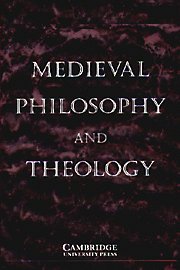No CrossRef data available.
Article contents
Arguments, Texts, and Contexts: Anselm’s Argument and the Friars
Published online by Cambridge University Press: 30 July 2001
Abstract
The contrast between the reception of Anselm’s Proslogion in the work of Bonaventure and in the work of Thomas Aquinas is often held up as a classic example of their competing intellectual assumptions. Some have located the intellectual prerequisites for the acceptance or rejection of Anselm’s argument in the prior acceptance of univocal or analogical accounts of being.In general terms, the interpretation of Bonaventure as leader of an Augustinian tradition, and of Thomas as representative of Aristotelianism, can be found in the work of E. Gilson, A History of Christian Philosophy in the Middle Ages (London, 1978). On Bonaventure’s refinement of Anselm in the context of the Augustinian tradition, see H. R. Klocker, S.J. “Bonaventure’s Refinement of the Ontological Argument,” Mediaevilla 4 (1978): 209–23. On anological and univocal accounts of being as factors determining attitudes to Anselm’s argument, see H. J. Johnson, “Contra Anselm But Contra Gentiles: Aquinas’s Rejection of the Ontological Argument,” Schede Medievali 13 (1986): 18–27. P. A. Daniels argued that the prerequisites for Bonaventure’s acceptance of the argument were not his “ontological” mode of thought, or a doctrine of the innate idea of God within the soul, but in his acceptance of examplar causality.P. A. Daniels, Quellenbeiträge und Untersuchungen zur Geschichte der Gottesbeweise im Dreizehnten Jahrhundert (Münster, 1909), pp. 131, 156. Half a century later, Jean Chattillon, following Étienne Gilson, affirmed the more common view of the issue, that the acceptance or rejection of Anselm’s argument among the first scholastics of the thirteenth century depended upon their allegiance to Augustinian or Aristotelian traditions.Jean Chattillon, “De Guillaume d’Auxerre à Saint Thomas d’Aquin: L’Argument de Saint Anselme Chez Les Premiers Scolastiques du XIIIe Siècle,” Spicilegium Beccense 1 (1959): 209–31. Anton Pegis did the same when he insisted that recovery of the Anselmian argument in its original form involved stripping away the Aristotelian framework in terms of which the Proslogion has been read since Thomas.Anton C. Pegis, “St. Anselm and the Argument of the “Proslogion”,” Medieval Studies 28 (1966): 228–67.
- Type
- Research Article
- Information
- Copyright
- © 1999 Cambridge University Press




